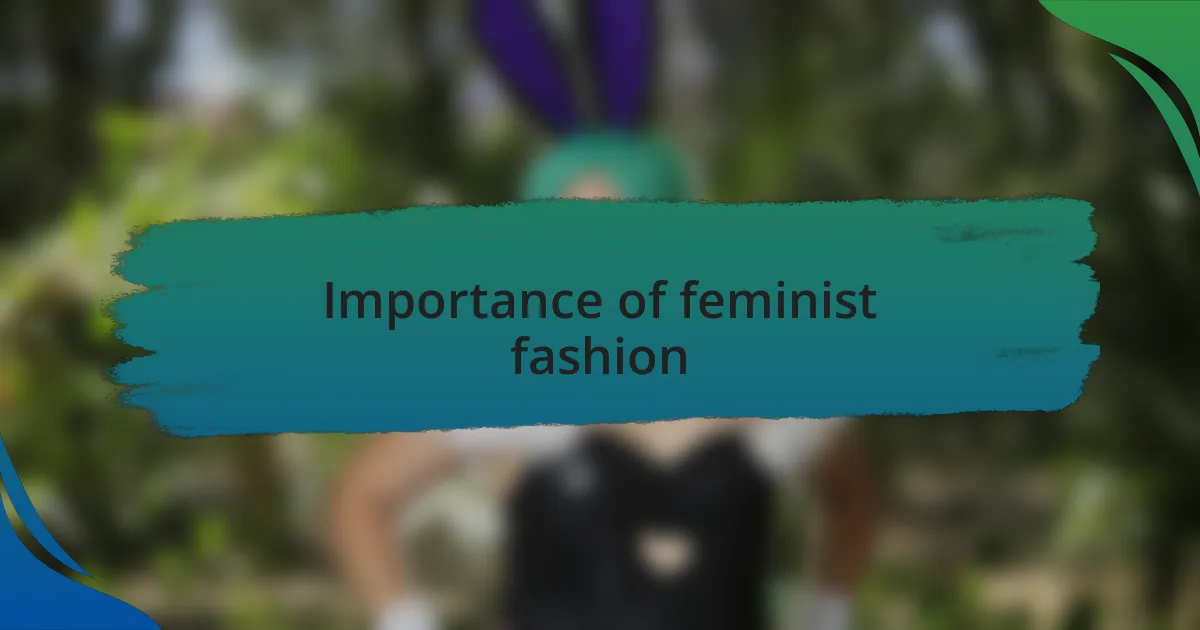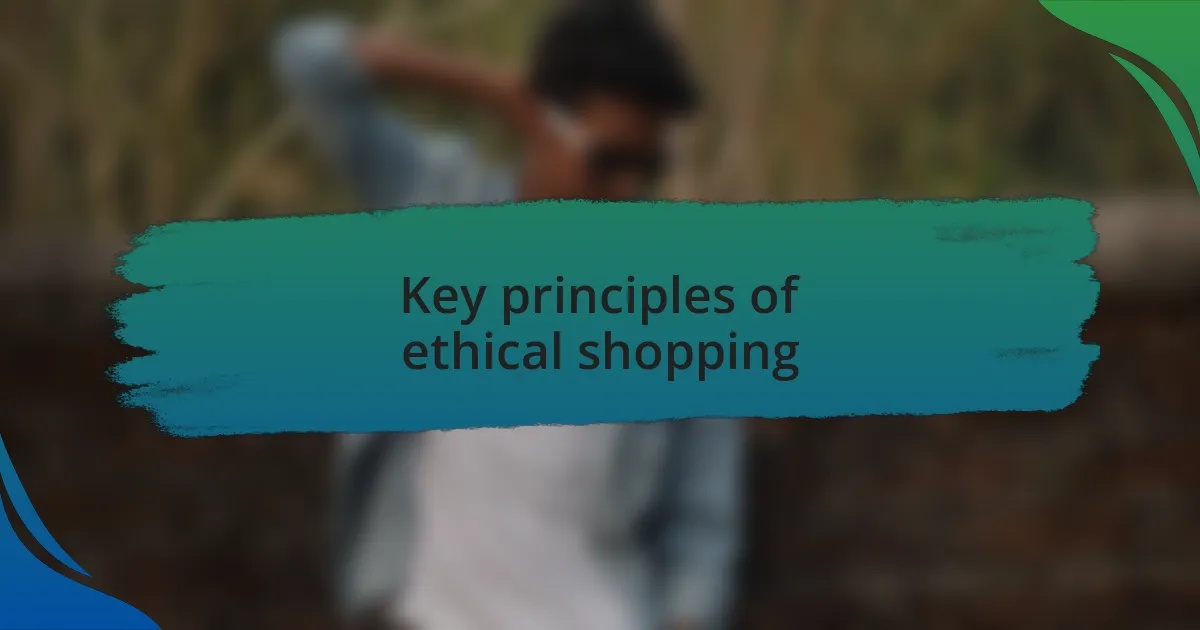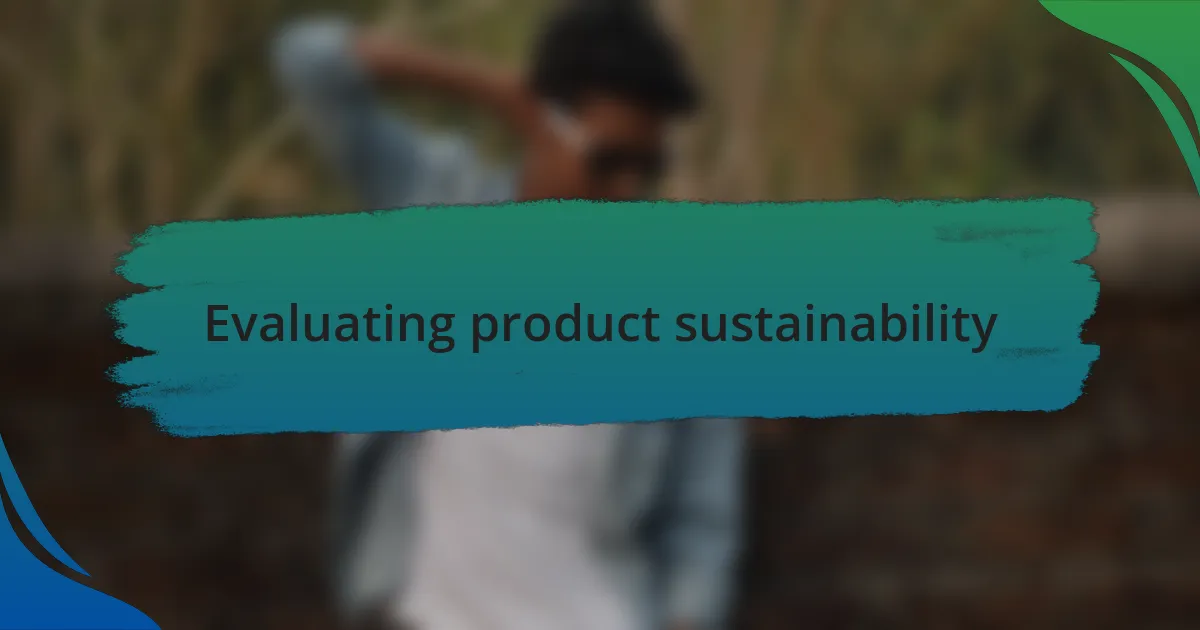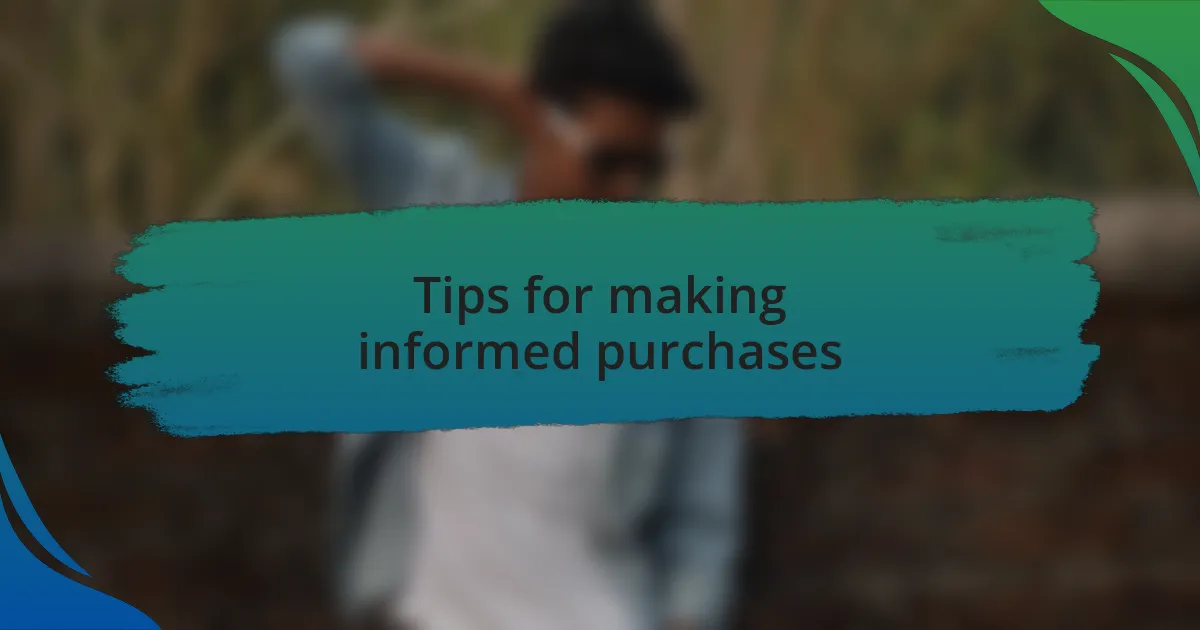Key takeaways:
- Mindful shopping emphasizes intentional choices that align with personal values, considering the ethical implications of purchases.
- Feminist fashion promotes diverse voices and challenges societal norms, fostering community and collective experiences in clothing choices.
- Key principles of ethical shopping include transparency in supply chains, supporting local artisans, and prioritizing quality over quantity.
- Making informed purchases involves researching brands, envisioning item longevity, and reflecting on the impact of each purchase on both personal values and the environment.

Understanding mindful shopping
Mindful shopping is about making intentional choices that reflect our values and beliefs. It’s more than just a transaction; it’s a way of aligning our spending habits with our ethical considerations. I remember a time when I impulsively bought a trendy top, only to realize later that it didn’t match my commitment to sustainable fashion. Have you ever felt that pang of guilt after an unthoughtful purchase?
When we engage in mindful shopping, we consider the impact of our purchases on people and the planet. This reflection can be as simple as asking ourselves: Who made this product? What materials are involved? I can recall a moment when I chose to buy a hand-crafted accessory from a local artisan instead of a mass-produced piece. The sense of connection I felt, knowing my purchase supported someone’s craft, was incredibly rewarding.
It’s about finding joy in the process, too. Mindful shopping encourages us to slow down and truly appreciate the items we choose to bring into our lives. I often ask myself: Does this item spark joy in me? That simple question has transformed my shopping experience into one of gratitude rather than just consumption. How do you approach your shopping journey?

Importance of feminist fashion
The significance of feminist fashion lies in its ability to challenge and reshape societal norms around how we view clothing and identity. When I reflect on my wardrobe choices, I realize that each piece I select isn’t just about fabric—it’s a statement about who I am and what I stand for. Have you ever thought about how your clothing reflects your beliefs?
Feminist fashion also plays a crucial role in amplifying diverse voices within the industry. It disrupts the traditional narratives that have long dominated fashion, providing platforms for marginalized groups. I remember discovering a brand started by women of color, and it felt empowering to support their vision and creativity. How can we ensure that all perspectives are represented in what we wear?
Ultimately, feminist fashion fosters a sense of community and solidarity among those who engage with it. It turns the act of dressing into a collective experience where we uplift one another through our choices. I’ve felt a deep sense of connection when participating in clothing swaps or local markets, sharing not just garments but stories and experiences. Doesn’t it feel powerful to know our choices contribute to something greater?

Key principles of ethical shopping
When I think about ethical shopping, transparency stands out as a fundamental principle. It’s important to know where our clothes come from and how they’re made. I remember a time when I paused to research a brand before making a purchase. I found out they were using sustainable materials and fair labor practices, and it not only made my shopping experience feel more meaningful but also connected me deeply to the artisans behind the clothing. Have you ever considered how a simple label could influence the way you feel about your wardrobe choices?
Another key principle is supporting local businesses and artisans. Shopping locally not only helps boost the economy but also fosters a sense of community. I’ve found that buying from local boutiques often brings unique pieces that tell a story—like a dress sewn by a talented local designer. It transforms shopping into an experience enriched by personal narratives. How often do we think about the lives we’re impacting with our purchases?
Lastly, reducing consumption by choosing quality over quantity is vital in ethical shopping. I strive to buy fewer items that are well-made and versatile. This practice not only helps minimize waste but also encourages a more thoughtful approach to fashion. I recall the time I invested in a timeless blazer that I still wear years later. It’s incredible how a single, carefully chosen piece can become a staple in my wardrobe. Are you ready to shift your shopping habits toward lasting choices?

Steps to identify ethical brands
To identify ethical brands, I start by looking for transparency in their supply chain. A few years ago, I discovered a brand that clearly outlined their production process. I felt a wave of relief knowing they had traceable sources for their materials and fair labor practices. Doesn’t it feel good to support a brand that values honesty?
Another step is to research certifications that signify ethical practices. For instance, I remember coming across a clothing line that held a GOTS (Global Organic Textile Standard) certification. This not only reassured me about their organic materials but also connected me to a larger movement of sustainability. How empowering is it to know you’re part of something bigger?
Finally, I often check for customer reviews and testimonials. I recently read a blog where a writer shared her experience with a brand that made a significant effort in giving back to the community. Hearing personal stories forged my trust in the brand and encouraged me to invest in their products. Have you ever felt more inclined to buy after reading someone else’s positive experience?

Evaluating product sustainability
When evaluating product sustainability, I always pay attention to the materials used and their environmental impact. I remember stumbling upon a jacket made from recycled plastic bottles. It made me think about how much waste we create and how brands can turn that into something useful. Wouldn’t it be amazing if all products had such thoughtful innovations behind them?
Additionally, I look into the brand’s production processes. I was pleasantly surprised when I found a footwear brand that uses solar energy in their factories. That realization not only aligned with my values but also sparked joy in me, knowing that my choices could support more eco-friendly practices. How often do we get the chance to contribute to the planet just by shopping?
Finally, I consider the brand’s overall approach to sustainability, including their commitment beyond just one product. I recall an instance when I discovered that a clothing line repurposes unsold garments into new designs instead of discarding them. It made me think: shouldn’t we all aim for such creativity and initiative? Supporting brands that think beyond the bottom line definitely gives me a sense of purpose.

Personal experience with mindful shopping
I remember my first experience with mindful shopping vividly. I had been on the hunt for a dress for a friend’s wedding, and instead of rushing to my usual fast-fashion retailers, I decided to explore a local sustainable boutique. Standing there, surrounded by pieces crafted with care, I felt a sense of connection to the artisans who poured their passion into each garment. Isn’t it fascinating how one genuine purchase can feel more rewarding than a cart full of cheap, trendy items?
While browsing, I also came across a brand that creates clothing from organic cotton dyed with natural pigments. As I tried a beautiful deep green top, I couldn’t help but think about the difference these choices make—not just for me, but for the planet. How many times had I overlooked the story behind my clothes just for the sake of convenience? This experience sparked a deeper appreciation for the journey each piece takes from creation to my closet.
It’s not just about purchasing; it’s about building a relationship with what I wear. Recently, I made a conscious decision to invest in a few timeless pieces instead of indulging in seasonal fads. Each time I wear those garments, I feel a sense of pride, knowing I made a choice that aligns with my values. Can you imagine how empowering it feels to wear clothing that not only looks good but also makes a positive impact?

Tips for making informed purchases
When it comes to making informed purchases, I always find it helpful to research the brands I’m interested in. I once stumbled upon a brand that boasted fair trade practices but discovered they weren’t as transparent as they claimed. I realized the importance of digging deeper; asking questions like, “Where are their products made?” and “What labor practices do they uphold?” can lead to truly ethical choices.
Another tip I’ve embraced is envisioning the item in my wardrobe over time. A few months ago, I saw a lovely jacket, but instead of rushing to buy it, I imagined how often I’d wear it and if it truly fit my style. That moment of reflection helped me avoid unnecessary purchases and led to a thoughtful decision that I still celebrate every time I wear that jacket in various outfits.
Lastly, considering the longevity of the item is crucial. I once bought a pair of trendy shoes that seemed perfect initially, but after a few wears, I regretted my choice. They wore out quickly, and I wished I had prioritized durability over fleeting fashion. Now, I ask myself: “Will this stand the test of time?” and “Is this a piece I can love for years to come?” This mindset shift has truly transformed my shopping habits.